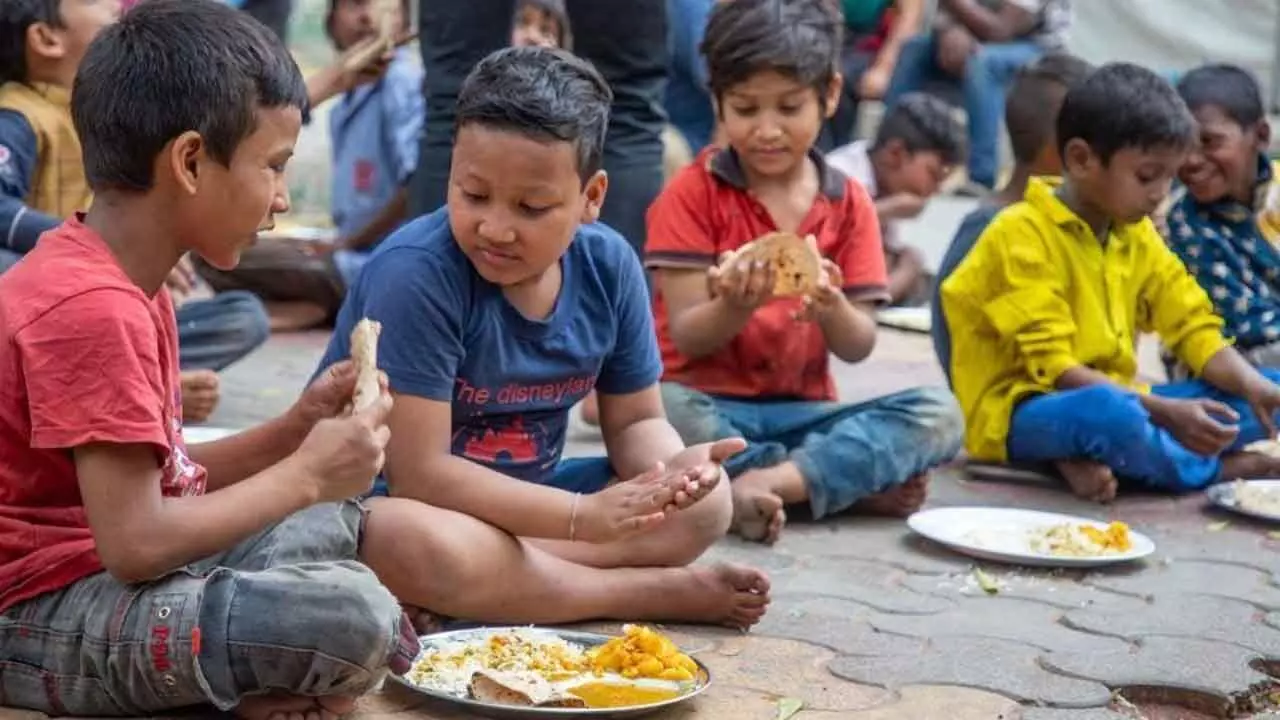Nutrient deficiency among school children in Telangana

For children of Bal Vatika and primary classes, a hot cooked meal per child consists of 100 grams of food grain (rice/wheat/nutri-rich cereals), 20 grams of pulses, 50 grams of vegetables, and 5 grams of oil/fat to provide 450 calories of energy and 12 grams of protein. For children of upper primary classes, it consists of 150 grams of food grain (wheat/rice/nutri-rich cereals), 30 grams of pulses, 75 grams of vegetables, and 7.5 grams of oil/fat per child to provide 700 calories of energy and 20 grams of proteins.It was observed in the diet surveys, the macronutrients are not being met through the PM Poshan Scheme. Steps must be taken to ensure that the children should get adequate/stipulated energy under the scheme.
Recommendations to State government
- State should adopt stringent mechanisms to ensure that children receive the prescribed quantities of food grains, pulses, vegetables, and other ingredients as per their entitlement
- Since most of the students and parents requested to provide eggs daily and some of them also requested to provide milk/buttermilk, then only children eat enough food for lunch, the authorities may look into these aspects for its feasibility implementation
Millets may be included in the menu once a week
SCHOOLS WHERE STUDY WAS CONDUCTED
- Khammam and Yadadri Bhuvanagiri - 1919 Total participants selected for the study
- 1002 in Khammam district and 917 inYadadri Bhuvanagiri district
Hyderabad: Micronutrients deficiency in school children in Telangana was revealed in the study conducted by The Joint Review Mission constituted by Ministry of Education, Government of India. The committee visited 78 schools (40 in the district of Khammam and 38 in Yadadri Bhuvanagiri) from November 21 to 28, 2022 to review the implementation of the PM Poshan Scheme in the State of Telangana. The National Institute of Nutrition in Hyderabad extended support to the committee which ledthe study and the report was recently released by the Ministry of Education.
The JRM team has covered 1,919 children (in 1,002 Khammam district and 917 in Yadadri district) for nutritional status assessment including anthropometric measurements, clinical examination for nutrition deficiency signs, food and nutrient intakes in the sub-sample of children.
During the visit JRM team collected information on enrollment and the number of children availing of meals for the last 10 days. A total of 5,695 children were enrolled in the visited schools, out of which 4,199 children (74 per cent) availed of hot cooked meals on an average basis during the last 10 days. The coverage is about 82 per cent in Khammam and 67 per cent in Yadadri Bhuvangiri.
About 25 per cent of school children were suffering from undernutrition and it was high in Yadadri Bhuvanagiri district as compared to Khammam (22 per cent).
However, the average cereal intake of some primary school children was found low as 67g/day as against the stipulated PM POSHAN nutrition norms of 100g/day, and among some of the upper primary school children, it was 92g/day as against 150g/day. Primary school children's fat and oil consumption (2.2g against stipulated 5g), vegetables (41g against stipulated 50g). Similarly, the intake of fats and oils (4g against the stipulated 7.5g), and vegetables (49g against the stipulated 75g) for upper primary school children was also found insufficient in the Yadadri district.
The committee identified several areas of concern which include kitchen devices have not been procured even after two and half years of the release of Central government funds, kitchen-cum-stores not available in the majority of the schools, firewood was used for cooking in almost all the schools, and a lot of smoke is being accumulated in the premises.








